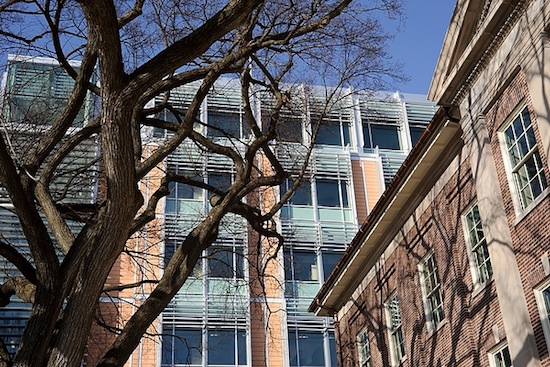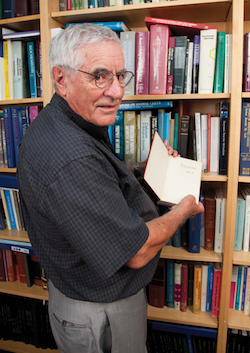Biochemical Sciences Complex to be named after Hector F. DeLuca

Contrasting modern and historic architecture details are pictured in this view of the newly constructed Biochemical Sciences Building, at left, and the renovated Biochemistry Building’s brick exterior.
Photo: Jeff Miller
The University of Wisconsin System Board of Regents voted Friday afternoon in favor of naming three UW–Madison buildings and a campus complex after renowned biochemist Hector F. DeLuca.
The Hector F. DeLuca Biochemical Sciences Complex will consist of the Hector F. DeLuca Biochemistry Building (420 Henry Mall), the Hector F. DeLuca Biochemical Sciences Building (440 Henry Mall), and the DeLuca Biochemistry Laboratories (433 Babcock Dr.). The buildings house members of the Department of Biochemistry in the College of Agricultural and Life Sciences and the Department of Biomolecular Chemistry in the School of Medicine and Public Health.

Hector DeLuca treasures a pioneering textbook about vitamins that was given to him and signed by his mentor, Harry Steenbock.
Photo: Wolfgang Hoffman
The decision represents an unprecedented move to name the buildings after a living individual within five years of UW System employment. DeLuca, a UW–Madison professor emeritus of biochemistry, retired in June 2011.
The building complex will be just one legacy of an exceptionally productive career. During a research enterprise spanning more than six decades, DeLuca has published more than 1,100 research papers on the metabolism and activity of vitamins and hormones in the body, notably vitamins A and D. One of his early discoveries was how vitamin D is converted in the body to an active hormone, pioneering a new field within endocrinology and leading to new treatments for bone diseases such as osteoporosis and rickets that have affected millions of patients.
“Hector DeLuca is the embodiment of the Wisconsin Idea,” says Kate VandenBosch, dean of the College of Agricultural and Life Sciences. “He is an amazing researcher who has trained generations of scientists and has successfully translated his discoveries to the marketplace, where they help patients around the world. Hector is without peers in his contributions to research, teaching and outreach. It is fitting that his contributions be recognized in this way.”
DeLuca is also a successful entrepreneur with an eye toward extending the impact of his discoveries on and beyond campus. He founded two companies, Bone Care International and Deltanoid, and has been involved in the development of eight drugs now sold worldwide. With nearly 2,000 U.S. and foreign issued and filed patents to his name, DeLuca’s inventions have generated more than $500 million in royalties to the Wisconsin Alumni Research Foundation (WARF).
“This is a very well-deserved honor for Hector. His contributions to science, human health, UW–Madison’s Biochemistry Department and WARF’s success are unequaled. The earnings from his innovative vitamin D technologies have allowed WARF to return tens of millions of dollars to the university through our annual grants,” says Carl Gulbrandsen, WARF managing director. “For more than 50 years, he has remained incredibly loyal to the university and WARF’s mission to encourage, aid and support university research. He stands as a model for other UW–Madison scientists to learn from and emulate.”
“He is an amazing researcher who has trained generations of scientists and has successfully translated his discoveries to the marketplace, where they help patients around the world.”
Kate VandenBosch
DeLuca started at UW–Madison in 1951 as a graduate student with the famed Harry Steenbock, who was known for his discovery of a way to increase the vitamin D content of food. DeLuca extended his advisor’s research program as an assistant professor in 1959 and in 1965 was named the Harry Steenbock Research Professor of Biochemistry.
He has ably carried on his mentor’s tradition of scholarship and teaching in the decades since. He chaired the Department of Biochemistry for 30 years and mentored more than 100 graduate students and 100 postdoctoral fellows, seeding multiple generations of skilled researchers. His scientific accomplishments have been recognized with numerous honors and awards, including three honorary doctorates and election to the National Academy of Sciences and the American Academy of Arts and Sciences.
In retirement, DeLuca still maintains an active research lab in one of the three buildings that will soon bear his name. He and his colleagues continue to synthesize new vitamin D analogs in search of unique and useful properties for additional pharmaceutical applications.
“Naming this complex after Hector is a highly-deserved honor that speaks to his lasting impact on campus and in the larger scientific community,” says current biochemistry chair Elizabeth Craig. “Hector has had a tremendous and long-lasting influence on both basic and translational science, all the while guiding the Department of Biochemistry and the biochemical sciences as a whole with strong leadership over many decades.”




